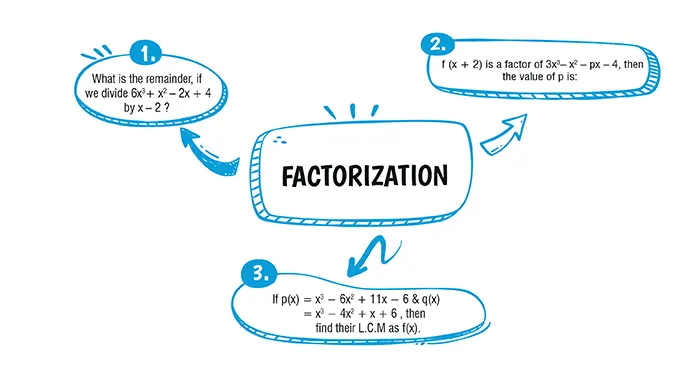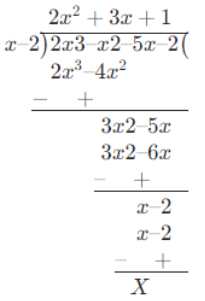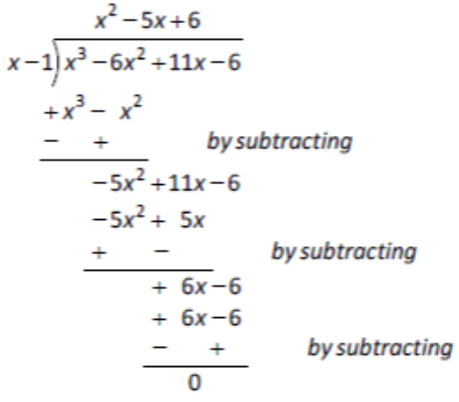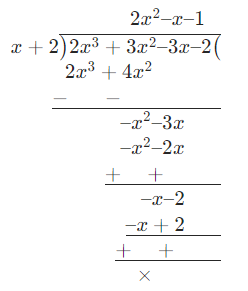Table of Contents

Ans. (b) 52
Explanation:
Let,
p(x) = 6x^3+ x^2 – 2x + 4 \\
\text{When,} \\
\text{p(x) is divided by x – 2,} \\
\text{Remainder = p(x = 2)} \\
= 6(2)^3 + (2)^2– 2(2) + 4 \\
= 48 + 4 – 4 + 4 = 52
Ans. (d) 16
Explanation:
Let,
f(x) = 3x^3– x^2 – px – 4 \space \space ...(i) \\
\text{Since, (x + 2) is a factor of f(x), f(–2) = 0} \\
⇒ 3(–2)^3 – (–2)^3 – p(–2) – 4 = 0 \\
⇒ –24 – 4 + 2p – 4 = 0
⇒ 2p = 32
⇒ p = 16
Explanation:
Given expression is 2x^3 – x^2 – px – 2 and x – 2 is the factor.
(i) x – 2 = 0, x = 2 in expression
\\2 (2)^3 – (2)^2 – p (2) – 2 = 0\\
⇒ 16 – 4 – 2p – 2 = 0
⇒ 10 – 2p = 0
⇒ p = 5
(ii) Putting the value of p

Explanation:
(i) For p (x), we have to find all possible factors of the constant -6
(By factor theorem, we have:)
Factors of - 6 are ∓1, ∓2, ∓3, ∓6, etc. and on putting the value in p (x) we get:
By hit and trial: for x = 1 we get p(i) = 13 - 6(1)^2 +11(1)-6 = 0.
Which clearly shows that (x-1) is a factor of p (x).
∴ on dividing p(x) by (x-1)will give:

Clearly p(x) = (x - 1)(x^2 - 5x + 6) which on further factorisation gives:
p(x)=(x - 1)(x - 2)(x - 3)...(A)
Similarly solving for q(x) we have:
q(x)=(x - 2)(x - 3)(x - 1)...(B)
∴ L.C.M. = (x - 1)(x - 2)(x - 3)(x + 1)...(c)
Explanation:
Let,
P (x) = 2x^3 + ax^2 + bx – 2 \\
\text{when} \\
\text{P(x) is divided by 2x – 3}\\
P\begin{pmatrix} \frac{3}{2} \end{pmatrix} =2 \begin{pmatrix} \frac{3}{2} \end{pmatrix}^3 +a \begin{pmatrix} \frac{3}{2} \end{pmatrix}^2 +b \begin{pmatrix} \frac{3}{2} \end{pmatrix} -2 = 7 \\
= \frac{27}{4} + \frac{9}{4} a + \frac{3}{2} b - 2 = 7
= 9a + 6b = 28 + 8 – 27
= 9a + 6b = 9
= 3a + 2b = 3 …(i)
Similarly when P(x) is divided by x + 2
⇒ x = – 2
∴ 2(– 2)3 + a(– 2)2 + b(– 2) – 2 = 0
⇒ – 16 + 4a – 2b – 2 = 0
⇒ 4a – 2b = 18 …(ii)
On solving equations (i) and (ii)
3a + 2b = 3
\underline{4a – 2b = 18}
(On adding (ii)
7a = 21
a = 3
On substituting value of a in equation (i)
3 × 3 + 2b = 3
2b = 3 – 9
b =\frac{-6}{2}
=-3b = – 3a = 3, b = – 3
On substituting value of a and b
2x^3 + 3x^2 – 3x – 2
When x + 2 is a factor

Download Mind Map of this chapter
Download NowWant to Practice Mock Tests of this chapter
Practice NowDownload Important Questions of this chapter
Download Now| Chapter No. | Chapter Name |
|---|---|
| Chapter 1 | Goods and Service Tax (GST) |
| Chapter 2 | Banking |
| Chapter 3 | Shares and Dividends |
| Chapter 4 | Linear inequations |
| Chapter 5 | Quadratic Equations in one variable |
| Chapter 6 | Ratio and proportion |
| Chapter 7 | Factorization |
| Chapter 8 | Matrices |
| Chapter 9 | Arithmetic Progression |
| Chapter 10 | Geometric Progression |
| Chapter 11 | Coordinate Geometry |
| Chapter 12 | Reflection |
| Chapter 13 | Similarity |
| Chapter 14 | Loci |
| Chapter 15 | Circles |
| Chapter 16 | Constructions |
| Chapter 17 | Mensuration |
| Chapter 18 | Trigonometry |
| Chapter 19 | Statistics |
| Chapter 20 | Probability |
| Chapter Wise Important Questions for ICSE Board Class 10 Mathematics |
|---|
| Goods and Service Tax (GST) |
| Banking |
| Shares and Dividends |
| Linear inequations |
| Quadratic Equations in one variable |
| Ratio and proportion |
| Factorization |
| Matrices |
| Arithmetic Progression |
| Geometric Progression |
| Coordinate Geometry |
| Reflection |
| Similarity |
| Loci |
| Circles |
| Constructions |
| Mensuration |
| Trigonometry |
| Statistics |
| Probability |
CBSE Important Questions Class 10
ICSE Important Questions Class 10
CBSE Important Questions Class 10
ICSE Important Questions Class 10